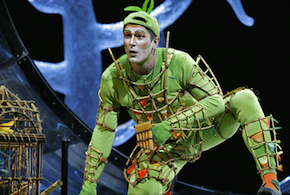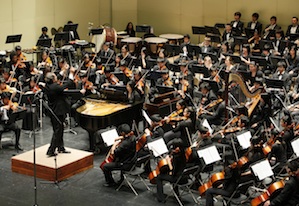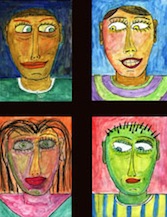- Explore The Magic Flute With S.F. Opera
- The California Youth Symphony Goes Down Under
- Celebrate Summer in the Garden of Memory
Explore theThe Magic Flute With S.F. Opera

There’s a great family event coming up — a series of interactive workshops sponsored by the San Francisco Opera that explore the making of Mozart’s The Magic Flute. You don’t need to be Dietrich Fischer-Dieskau or Joan Sutherland. A respect for opera is all you need, along with your wits, a sense of humor, and a desire to learn something about stagecraft and the making of an opera.
Oh — and a sense of wonderment. By all means, bring that. Tickets are $5, which you can reserve online, at sfopera.com. Workshops will last one hour and are offered for kids ages eight and up. (Children must be accompanied by an adult.) Initially, there will be some theater games, including throwing a ball around to encourage eye contact and instill a sense of working with other people.
The expectation is that each workshop will include not more than 80 people, who in turn will be broken down into smaller groups of 8 to 12. Each group will be given a scene from Act 1, including a synopsis and brief character descriptions. The notion is that someone in each group will come to the fore, take charge, assign roles, and lead an impromptu rehearsal. Everybody will be given some lines no matter how brief. All of this will take about 20 minutes and then the groups will present their scenes in order.
Afterwards, all workshop members will gather for the scene in Act 2, Tamino’s trial by fire and water. There may not be enough roles for everybody, but everybody will get the feeling of what it’s like to be in an opera.
Workshop times are Saturday, June 16 from 4-5 p.m. and 5:30-6:30 p.m.; Sunday, June 24 from 11 a.m.-noon and 12:30-1:30 p.m. One possibility is that you attend the workshop and then go to the actual opera afterward. The workshops will be held at Chorissima Hall at 44 Page Street between Gough and Franklin Streets.
The California Youth Symphony Goes Down Under
 Every two years the California Youth Symphony goes on the road: Last time it was Argentina, this time it’s New Zealand.
Every two years the California Youth Symphony goes on the road: Last time it was Argentina, this time it’s New Zealand.
Among the musicians traveling are Eric and Emily Jang. They’re 18-year-old twins, who have played the cello since they were 9. Why the cello? Because they tired of the piano and were attracted to a mellower sound. For years they sat side by side, but more recently, in the youth orchestra, he’s second chair and she’s third.
“Sometimes, I felt bad if he sat one seat ahead,” Emily says, noting their competitive spirit. “But at the same time, it was also comforting.”
They went to Cupertino High School. And now onto Brown University. He wants to do research; academic stuff. Maybe play music recreationally, like in a chamber orchestra. She feels the same way, she’ll keep playing the cello, but she has other interests.
If you wonder whether there’s a difference in their playing styles, or if they have a slightly different sound, Eric insists he doesn’t hear it.
She, on the other hand, says there is a difference. “He’s more musical but technically my rhythm is better. He’s freer. He plays with more feeling. I don’t have as much emotion. Playing with emotion comes with practice and I’ve been working on it. But I’ve found that you have to really feel it, you can’t mimic it.”
Her favorite piece is Strauss’ Rosenkavalier. She enjoys the complexity and music that “allows the cello to sing out.”
His favorite piece is Volkman’s Cello Concerto in A Minor. In regard to emotion he says: “I feel good when I play a difficult passage right.”
The Jangs are among and the rest of the California Youth leave on their trip to New Zealand on June 26, after a tour preview concert here on June 24 in Los Altos. Abroad, there will be five concerts, featuring largely American composers. Venues include Auckland, Rotarua, Wellington, Christchurch, and Oamaru. Local audiences: Hear the same program on June 24 at 2:30 p.m. at the Smithwick Theater at Foothill College in Los Altos Hills. Tickets are $15 for general admission and $10 for students and seniors.
Celebrate Summer in the Garden of Memory
 “It’s been here since the rocks,” said Mr. Kelsey drolly, referring to the Chapel of the Chimes, the largest above ground cemetery west of the Mississippi. He doesn’t know how many of the departed are kept here, but total internments in the seven digits and every 10 years they add new space.
“It’s been here since the rocks,” said Mr. Kelsey drolly, referring to the Chapel of the Chimes, the largest above ground cemetery west of the Mississippi. He doesn’t know how many of the departed are kept here, but total internments in the seven digits and every 10 years they add new space.
Actually, the Chapel of the Chimes in Oakland, with its mausoleum and columbium, and opened its doors in 1909. In 1928 it was recast using designs by Julia Morgan. Now it’s the size of a city block, and for the last 16 years, the venue for the Garden of Memory, walk-through concerts celebrating summer, and featuring largely new music. Groups play in the niches, crypts, and cloisters, and the magic of the architecture is that it insulates the sound of the various groups.
Among those you’ll hear this year — on the Summer Solstice, no less — is Bob Bralove, ever a thoughtful and daring musician best known as keyboard-synthesizer for the Grateful Dead in the 1990s. His most notable works are on the albums, Infrared Roses and Built To last.
Bralove, who has 30 musicians with him, works from video palates that include various images including paintings. He may have up to 60 images on a pallet. Using a digital keyboard he can assign an image to a note and in that way explore that nature of a note or a riff.
“The pieces have to narrow in on a specific thing,” he says, “that’s part of being articulate, but some palates are more flexible. One of the pieces we’re doing is Two Faced Blues, which is comic and so the images are of cartoony faces. Other pallets are designed to illustrate harmony.”
These days Bralove is consumed with finding ways to hold a higher level of communication in his work.
“It’s a strange world because so much of the conversation is now open. So many people can be involved. But the conversation is dumbed down and inarticulate. The Grateful Dead were articulate and they communicated amazing, amazing things. What I’m trying to do is to take that to the next level.”
Bralove’s advice to his audience is to let the experience happen. “This is about letting go. If you struggle with every detail it would be like having the read the score yourself. But that’s not the point. This is all a commitment to being in the present, to go along on a musical adventure.”
